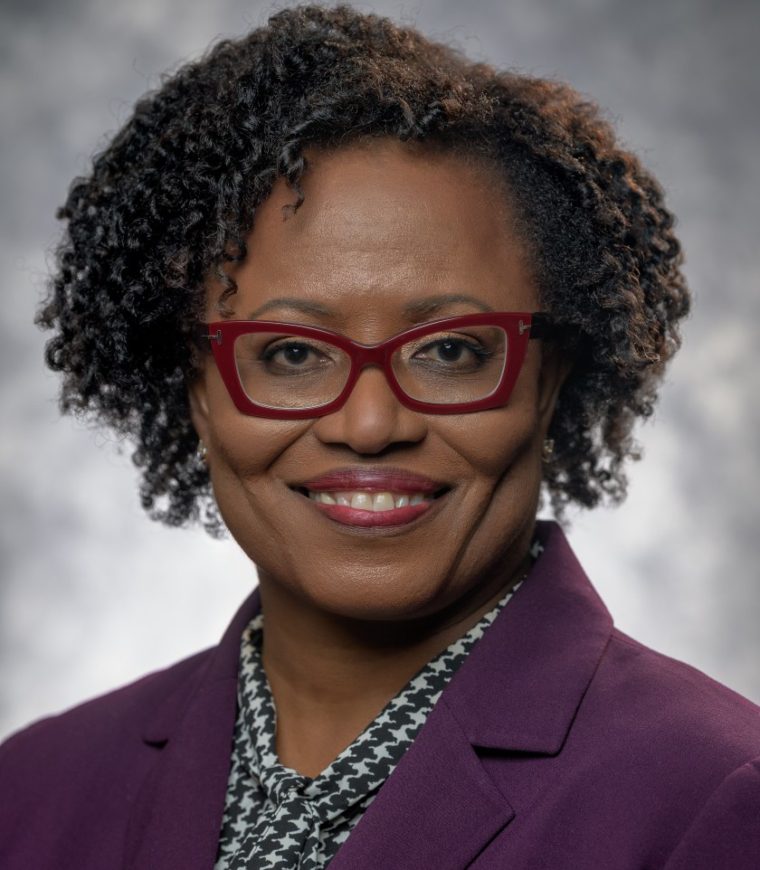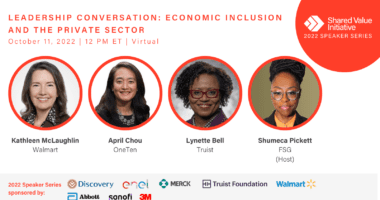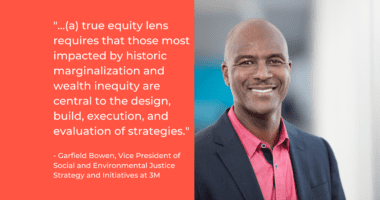Truist Foundation is committed to Truist Financial Corporation’s purpose to inspire and build better lives and communities. Established in 2020, Truist Foundation makes strategic investments in nonprofit organizations to help ensure the communities it serves have more opportunities for a better quality of life. Truist Foundation’s grants and activities focus on building career pathways to economic mobility and strengthening small businesses.
As a follow-up to Lynette Bell’s compelling keynote on economic inclusion at the Shared Value Initiative’s 2022 Speaker Series event in October 2022, we sat down to ask her to share more of her thoughts on this important aspect of advancing greater equity in our society.
SVI: How is inequality connected to economic exclusion and inequity?
Lynette Bell: According to the World Inequality Report 2022, the poorest half of the global population barely owns any wealth at all, possessing just 2% of the total. In contrast, the report found that the richest 10% of the global population own 76% of all wealth. That said, we know inequality is grounded in the historied exclusion of certain groups from fairly and fully participating in our economy.
In the U.S., we have witnessed a long history of marginalization of various minority groups and the many ways our economic system has stymied their wealth creation and economic advancement. For example, through historic redlining, Black Americans were systemically denied mortgages, leading to housing segregation and a disparity in home ownership. For some, the answer to bridging that gap was establishing their own businesses to provide goods and services that could create pathways to economic mobility. However, as Black Americans continue to pursue entrepreneurship, the Center for American Progress (CAP) reports that still, Black-owned businesses are seven times less likely than white-owned businesses to obtain loans in their founding year, and when they do, those loans are usually considerably smaller. CAP also found that the average Black-owned business obtains about one-third in startup capital in its first year compared to the amount obtained by white-owned businesses. It is because of long-standing statistics like these that economic inclusion is central to leveling the playing field so that everyone has equal opportunity to thrive.
The path forward is about addressing fundamental systemic disparities and the private sector has a crucial role to play. Recognizing that private industry holds the keys to generational wealth, it shares in the responsibility to do the work of advancing an economy that better serves us all.
SVI: How can private sector organizations meet this moment?
Lynette Bell: Aside from being slow to talk and quick to listen, private industry should lean into partnering with the communities in which they operate to co-create solutions. Residents, leaders and organizations on the ground know their communities best, including what programs and initiatives would bring about meaningful change. We know that partnerships are critical in business, and they are just as critical in community.
To further those relationships, the private sector must also commit to implementing feedback loops and open channels of communication that provide continued opportunity for community members to weigh in. It is also important to ensure that outputs and reporting mechanisms benefit community members as they do the company.
SVI: How has Truist Foundation lent its support to advance economic inclusion?
Lynette Bell: At Truist Foundation, we are committed to standing for better, to listening to and acting on the needs of our communities and working together to solve them.
With the mission to advance economic opportunity and inclusion for all, we are investing in community-led solutions aimed at addressing the deep, systemic inequities holding back people and communities across our country.
We also believe that economic inclusion starts by upholding the principles of justice-centered philanthropy, which is why the Foundation also prioritizes supporting organizations that uplift Black, Indigenous and People of Color communities.
Truist’s work with NC Rural Center is an example of true partnership in practice – one that will help spark lasting change. NC Rural Center is a nonprofit that aims to improve the quality of life for North Carolina’s rural residents. Together, Truist Foundation, Truist Charitable Fund and NC Rural Center launched CornerSquare Community Capital, a fund for Community Development Financial Institutions (CDFIs) that provides them with the financial support they need to make transformative loans to racially and ethnically diverse small business owners, women and individuals in low- and moderate-income communities.
Truist Foundation has also had the honor of working with First Step Staffing, the largest nonprofit employment agency in the country dedicated to providing economic opportunity and creating pathways to self-sufficiency. Truist Foundation helped First Step Staffing establish two new branch locations across the U.S. and pilot an enhanced client services program featuring client assessments, housing placement with financial assistance and additional upskill training opportunities. In 2021, First Step Staffing helped place more than 8,000 individuals into jobs and provided more than 77,000 rides to and from work. By ripple effect, First Step Staffing’s client base earned $57.1 million in paid wages last year.
SVI: What message do you have for private sector leaders who have the power and influence to bring about change?
Lynette Bell: We all play an undeniable role in advancing economic inclusion, and therefore creating equitable opportunity for all. Not directly engaging the individuals and communities we seek to support is often the most basic misstep. By innovating alongside those experiencing inequity firsthand, we can co-create the strongest solutions. Truist Foundation is in the business of providing grants to nonprofits that are addressing complex challenges by creating sustainable wealth-building opportunities for historically excluded communities. Bringing everyone to the table is fundamental to making a meaningful difference and accelerating change.
Lynette Bell, president of Truist Foundation – the philanthropic arm of Truist – focuses on building career pathways to economic mobility and strengthening small businesses. Learn more about the work she is leading at Truist.com/Foundation.




